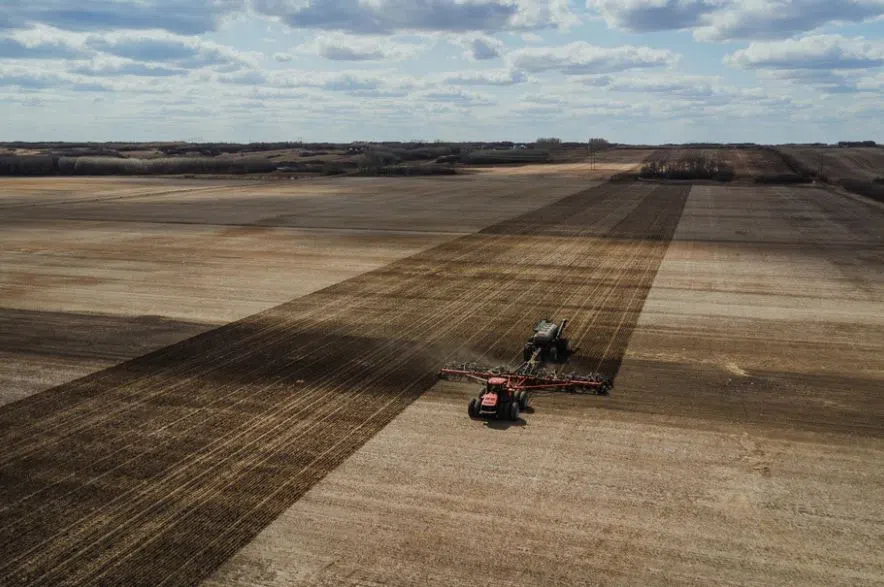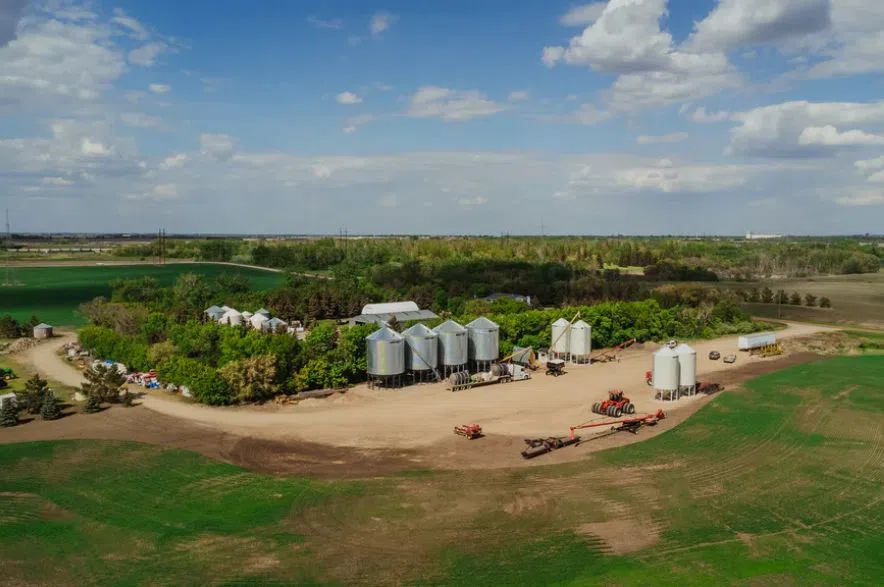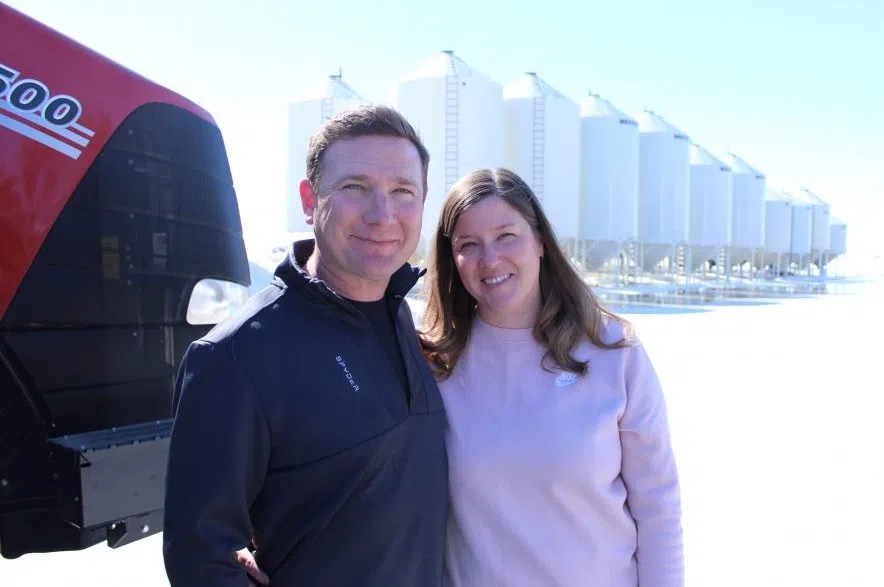Imagine a slow Sunday morning. The sun streams gently through the kitchen window, casting a warm, golden glow on the wooden table.
The smell of pancakes, fresh off the griddle, fills the air. The sound of laughter and conversation echoes through the room, where a family of all ages gathers.
Read More:
- The gift of life: How two organ donors saved Saskatoon’s Emma Crawley
- The lost community of Tokyo, Saskatchewan: Michif’s vanishing voice
- Survive the wilderness: Tips from a Sask. search and rescue expert
It’s a scene many in Saskatchewan know well. One that evokes warmth, connection, and the simple joys of family life.
For Derek Dery and his wife Tricia, this image isn’t just a memory — it’s at the heart of their family’s story.
Today, they’re sharing that story in a new way, extending their family’s traditions beyond the kitchen table and onto grocery store shelves around the country.
Listen to the story on Behind the Headlines:
Innovating tradition
To Dery, the farm where he lives and works is more than just land. It’s a living history.
Though the name “Sixteen Grains” was only adopted in 2022, this family farm has been a fixture in Saskatchewan for generations.
The land, passed down from one generation to the next, holds deep meaning for them.
Dery speaks of it with pride.
“The farm is my wife’s family farm,” he explained. “The farm has been around for just over 100 years.”
But even with such a long history, Dery said his family knew they needed to adapt in order to continue their legacy.
“We have a few different pieces to our farm,” Dery shared. “We’ve been in the food space creating consumer packaged goods for about a year and a half.”
With farming as their foundation, they began to experiment with something new: food products made with the grains they’ve been growing for generations.
Tricia’s family recipe for pancakes became the perfect starting point.
“It’s just a recipe we’ve always used,” she said with a smile. “If we go for breakfast, I never order pancakes because I don’t like pancakes unless they are our pancakes.”
This simple, cherished recipe, passed down through generations, was at the core of the couple’s first product: a pancake mix made with their own milled wheat.
The pancake mix was their first offering, but it wasn’t long before they began to see the potential to expand their products. They discovered that their flour worked especially well for other baked goods.
“We decided to make a pizza dough mix, and we hosted all of Tricia’s family to our house. We had a kind of pizza-making party,” Dery recalled with a laugh. “We tried a few different doughs. There may have been a glass of wine or a beer drank, and we formalized the recipe.”
Their flour, which is finely milled and dense in nutrients, soon gained a following among bakers — especially those making sourdough.
“It’s a high-extraction flour, so we polish the wheat to remove most of the bran mechanically. That’s the outside layer of the wheat seed, which is, texture-wise, a little bit harder and less palatable to eat. Then we mill it to 80 per cent extraction, so we mill it really fine, and we float out even more of those flakes of bran. So it’s a really fine, super dense flour that has a really high water absorption rate,” Dery explained.

The flour used in Sixteen Grains products is made from wheat grown and milled right here in Saskatchewan. (Submitted)
The highs and lows of running a food-based business
Despite the high-quality products they are creating, they’ve also had to contend with the harsh realities of running a food business, especially in today’s uncertain economic climate.
“The food space is exceptionally difficult to be financially sustainable,” Dery said.
“Let’s compare it to our farm, which is our core business. You know, I’ve taken for granted that we can grow most crops in Saskatchewan, and there is a market for those crops pretty much every week of the year. Some crops might not be the price that you want to market it at, but there’s typically always a market for it.”
He’s found entering the food industry to come with a steep learning curve.
“When you enter into the food space and ingredient business, you create these products, and you really have to create them on spec. You have to manufacture them. As soon as you manufacture them, the hourglass tips over and you have a perishable product that is only good for two years. You have to try and find a market for it, so that is the challenge.”
The shifting tides of international trade have presented another hurdle for the family business to overcome.
“A grain farm is our core business, and there’s just a lot of uncertainty,” Dery said.
“But recently, the Chinese tariffs on Canadian canola and peas are absolutely more devastating than the tariffs from the United States. It’s just really created an uncomfortable business environment. It’s just a lot of uncertainty. It’s challenging to watch the news or watch Twitter.”
Dery said he’s gained a deeper understanding of how crucial it is to support Canadian businesses.
“I know now what is at risk for businesses that develop food products and consumer packaged goods in Canada,” he explained.

The family’s primary business is grain farming, but they have expanded into consumer packaged goods and are planning to launch a farm tourism business. (Submitted)
“As consumers, when Tricia and I are working through our budget or looking at the store shelf, we’re very price-sensitive. Buying Canadian, buying local, can be a little bit more expensive at times. That doesn’t mean there’s big margins for local and for Canadian companies. Until you scale your products and you can order 20,000 pouches at a time, your costs are quite high.”
He also pointed out that buying local doesn’t always mean the product is explicitly labeled as “Made in Canada,” but it could still be tied to Canadian farmers.
“Buy Canadian. Buy local. We’re all supporting that, and our family supports that as well. But have a full awareness of the entire value chain,” he said.
In simple terms, a value chain is the journey a product takes from the farm to the shelf. It includes growing the ingredients, processing them, packaging and then getting them to stores.
“A lot of the products in the pantry could come be produced from grain and oil seeds grown in Saskatchewan as an example. And it’s just it’s a very complicated value chain,” Dery explained.
Looking ahead: Building traditions through food
The vision of the owners of Sixteen Grains is clear.
“Our goal is to create a generational agribusiness. Our goal is to take the risks so our children have the opportunity, and children of the family have the opportunity to be a part of the business as we grow,” Dery said.
“And if we have full-time young operators with families, that there’s an opportunity for them in the ag space.”
And their journey is far from over. As they expand, they’re launching a new line of cookies, hoping to become a part of even more family traditions.
“We want to be part of the Sunday suppers, the Friday pizza parties. We want to be the cookie that you have with your son or daughter after the sporting event,” Dery shared.
For the Dery family, this isn’t just about food. It’s about building something that lasts, just like the unforgettable memories made around the table with family.













